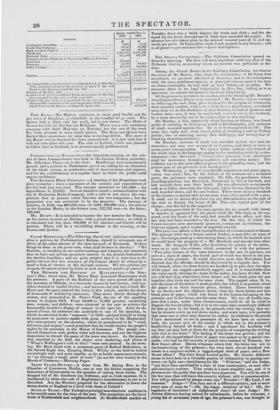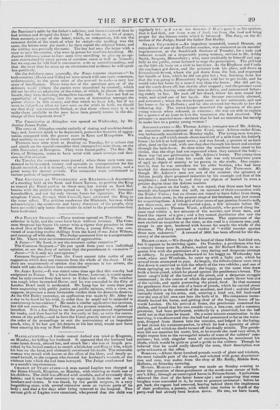Tim Smcni. ConsussmNs.—The Salisbury Commission opened on Saturday morning. The
first and most important trial was that of the Pythouse rioters, concerning whom an account was published at the time.
1 Among the Grand Jurors in the Salisbury Commission, we observe the name of Mr. Benett, who, from the circumstance of his being first mentioned, we presume officiated as foreman ; and in the subsequent trial, the same gentleman appears as principal witness against the men on whose criminality he had, half an hour before, sat as judge. We presume there is no legal irregularity in this ; but, looking at it as spectators, we cannot but perceive its moral irregularity.
Of the prisoners, seventeen in number, tried for breaking Mr. Benett's thrashing-machine, fifteen were convicted. • Mr. Benett—whose courage in following the mob from place to place for the purpose of witnessing their criminal conduct, with a view to its future punishment, we admire more than we do the discretion of tints bearding a band of ignorant and lawless men—was, it may 13C recollected, severely cut in the forehead, by a stone thrown by one of the rioters that lie was watching.
On Monday, a boy, apparently about fourteen or fifteen, was found guilty of assisting in destroying a mill at Guidhampton, and sentence of death recorded against hirn. He is to be transported for life. The same day, eight men were found guilty of breaking a mill in Wilton parish ; two of extorting money (tive shillings); and twenty-four of breaking thrashing-machines. On Tuesday, sentence of death was recorded against two men for extortion ; one man was sentenced to fourteen, and thirty or forty to seven years' transportation. We cannot better indicate the interest of the whole than in the language applied to the concluding trials by a .contemporary—the Standard. " !-.•:everal other prisoners were afterwards tried for destroying thrashing-machines and extorting money. The evidence was to the same effect as given in the preceding cases, and the greater part of the prisoners were found guilty."
On Wednesday, a case of considerable importance and great aggravation was tried ; but, by the failure of the evidence on a technical point, the prisoners were acquitted. Mr. Pile, the gentleman whose thrashing-machine was destroyed, threatened to fire at the mob, and had actually fired over their heads. He was afterwards so extremely rash as to follow theta into the rick-yard, where he was disarmed by the mob, knocked down, and his arm broken. There were about a hundred of the rioters—a fearful odds to one man, even when armed with a gun. It could not be shown that there was auy determination on the part of the mob to destroy the house of Mr. Pile—the capital part of the charge ; and this led to the acquittal. In a subsequent trial of the same parties, for an assault with intent to murder, it 'appeared that the pistol which Mr. Pile fired, as he supposed, over the heads of the mob, had actually taken: effect, and that one man had been wounded in the arm. On this fact, of which the Crown lawyers were previously ignorant, coming out in evidence, the trial was stopped, and a verdict of acquittal entered.
The next case affords a fine exemplification of circumstantial evidence. The prisoner tried was a farmer named Looker, a man fifty-six years of age ; the charge, sending a threatening letter, in which he declared that he would burn the property of a Mr. Rowland, and murder him afterwards. Mr. Sergeant Wilde, after describing the nature of the letter, went on to state the evidence which connected it with the prisoner. "Two other letters, of the same character as the one in question, are part of a sheet of paper, the fourth part of which was found in the possession of the prisoner. It would therefore seem that Providence had directed that the offender should be discovered by a singular fact. You will remark, when the three letters are handed up to you, that the edges of the paper are ragged—peculiarly ragged ; and it is remarkable that the water-mark, bearing the name of the maker, has been divided. Now you will find that, when these three letters and the blank piece are put together, they form one and the same sheet. The ragged edges fit in, and the name of the maker is made perfect, bin which is at present, when the paper. is in three separate pieces, divided. There therefore can be no doubt—not the slightest doubt—that the three letters and this blank piece of paper, which was found in the bureau belonging to the prisoner, and in his house, are the same sheet. We can all readily sup. pose that a man, under these circumstances, would do all he could to disguise his handwriting; but it is at the same time exceedingly difficult for him to bear in his mind, as he proceeds with the writing, that unless he distorts every up and down stroke, and every turn, it is probable that some one or other may discover its author. In addition to the proofs I have mentioned we are in possession of, we have here an accountbook, the greater part of the entries in which are in the prisoner's handwriting beyond all doubt ; and I apprehend his Lordship will say that you may look at them for the purpose of comparing the writing with that in the letter." The finding of the letter was proved; and the affair of the ragged-edged sheet of paper was spoken to by a special constable, who had on the occasion of search been assisted by Taunton, the Bow Street officer. Eleven witnesses swore that the letter was not in the handwriting of the prisoner ; but what were eleven hundred witnesses to a sergeant-at-law, a ragged-edged sheet of paper, and a Bow Street officer ? The Jury found Looker guilty. Mr. Justice Alderson seems to have been in a veritable passion of indignation in passing sentence—no light one—banishment for life. "Prisoner," said the Judge, "you have been convicted by a Jury of your countrymen, on most clear and conclusive evidence. Your crime is a most dreadful one, and it is fortunate for the public that you have been found out. You will be one of the few men that will leave this country without pity or commiseration. You will go abhorred by almost every one."' Prisoner—" My Lord, I am innocent." Judge—" The Jury are of a different opinion, and so must every man of sense be."—Oh, the happy certainty of law ! . Oh, the ingenuity of barristers! oh enlightened Jury! oh rare Judge ! Mr. Justice Alderson having retired for refreshment, before he returned, a yotuig lad of seventeen years of age, the prisoner's son, was brought to the Barrister's table by the father's solicitor, and there coulessed that he bad written and dropped the letter ! The lad wrote on a bit tzf paper, from memory, a copy of the letter, which, on comparison, left not the remotest doubt of the truth of what he stated—the spelling was the same, the letters were lac simile ; he then copied the original letter, and the writing was precisely the same. The boy had sent the letter with a view to save his cousins, who were ko prison for machine-breaking. Mr. Justice Alderson seems to have been very unwilling to give up an opinion entertained by every person of common sense as well as himself; but we suppose he will Zi :id it convenient O do so notwithstandires, and that the next time he sums up on circumstantial evidence he wilfspeak less positively. On the Salisbury cases generally, the Time': reporter observes—" In both counties [Hants and Wilts] we were struck with one trait—common, unfortunately, tt the great mass of the accused in each—a very low state of intelligence. There were few of the questions put, or of the defences made (where the parties were unassisted by counsel) which did not involve au admission of the crime, of which, in almost the same breath, they were declaring themselves innocent. 'We have not had an opportunity of inquiring into the means of instruction amongst the poorer classes in this county, and that which we base left, but if we were to judge from what %ye have seen on the striais in both, we should say that they are extremely limited, or that those whose dutY it is to make them available to the poor have been grossly remiss in the discharge of that important trust."
The Commh:sion at Abingdon was opened on Wednesday, by Mr. Justice James Parke.
The cases at Abingdon consist entirely of rioting and machine-breaking; and, however much to be deprecated, present few features of aggravation compared with the graver cases in Kent and Hampshire. We find nothing in any of them worth recording.
Thirteen men were tried at Reading cm Tuesday, for a serious riot and attack on the special constables that attempted to seize them, on the 18th November, at Brimpton. They were found guilty. The Rev. Mr. Cove, of Brimpten, seems to have acted with much courage and decision on this occasion.
On Tuesday the sentences were passed ; when three men were condemned to be executed, twenty and upwards to transportation for life (death recorded, as it is termed), six or seven for fourteen years, and a great many for shorter periods. The remainder were condemned in various periods of imprisonment.
THE CoavteTs AT WINCHESTER AND READING:A deputation of a meeting held at the Kent and Essex Tavern, to petition the King to extend the Royal pardon to these men, has waited on Lord Melbourne with the petition there agreed to. It is signed by six thousand householders, and yet lay only twenty hours for signature. The Birmingham Union, through their Council, have addressed the King to the same effect. The peton condemns the Ministers, because, while acknowledging the numerous and heavy distresses of the people, they have not sufficiently borne those truths in mind in the prosecutions they have institated.



























 Previous page
Previous page